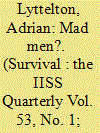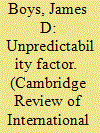| Srl | Item |
| 1 |
ID:
102421


|
|
|
|
|
| Publication |
2011.
|
| Summary/Abstract |
The Madman theory remains a reliable conversation stopper in current strategic debates. Saddam Hussein had to be destroyed because deterrence was deemed unworkable against a tyrant presumed to be irrational. The same argument is now used regarding Iran's clerical regime, often with the added claim that national suicide is an insufficient disincentive for rulers obsessed by eschatological ends. In all such arguments, the temptation to play the Hitler analogy is rarely resisted. The comparison is usually fanciful, but if it is going to be used, we should at least get Hitler right. This is among several important things that Ian Kershaw does in his admirable book.
|
|
|
|
|
|
|
|
|
|
|
|
|
|
|
|
| 2 |
ID:
168933


|
|
|
|
|
| Summary/Abstract |
This article reconsiders the theoretical logic behind the “Madman Theory”—the argument that it can be beneficial in coercive bargaining to be viewed as mad, or insane. I theorize about how we can best define perceived madness in a way that is relevant for analyzing coercive bargaining. I identify four types of perceived madness, broken down along two dimensions. The first dimension is whether a leader is perceived to (a) make rational calculations, but based on extreme preferences, or (b) actually deviate from rational consequence-based decision making. The second dimension is whether a leader’s madness is perceived to be (a) situational or (b) dispositional. I argue that situational extreme preferences constitute the type of perceived madness that is most helpful in coercive bargaining. I illustrate my argument using case studies of Adolf Hitler, Nikita Khrushchev, Saddam Hussein, and Muammar Gaddafi.
|
|
|
|
|
|
|
|
|
|
|
|
|
|
|
|
| 3 |
ID:
179802


|
|
|
|
|
| Summary/Abstract |
Five decades before Donald Trump sought to make a virtue out of his unpredictable approach to policy, Richard Nixon adopted a similar stance in regard to foreign affairs that became known as The Madman Theory. The Nixon-Trump comparison in regard to foreign policy and their embrace of a high-risk approach to international negotiations once in office, follows striking parallels between the two men’s campaign pledges in 1968 and 2016. This paper examines the Madman Theory to consider its implementation by the Nixon administration and its subsequent adoption by the Trump White House as both leaders sought to rationalize their unpredictable approach to international flashpoints. Through a consideration of speeches, statements, transcripts and tweets it is possible to discern the manner in which both presidents embraced this approach to international relations, and the extent to which it served their interests as President of the United States.
|
|
|
|
|
|
|
|
|
|
|
|
|
|
|
|
| 4 |
ID:
152570


|
|
|
|
|
| Summary/Abstract |
Just a few months into the Trump administration, it still isn’t clear what course the president’s foreign policy will ultimately take. What is clear, however, is that the impulsiveness, combativeness, and recklessness that characterized Donald Trump’s election campaign have survived the transition into the presidency. Since taking office, Trump has continued to challenge accepted norms, break with diplomatic traditions, and respond to perceived slights or provocations with insults or threats of his own. The core of his foreign policy message is that the United States will no longer allow itself to be taken advantage of by friends or foes abroad. After decades of “losing” to other countries, he says he is going to put “America first” and start winning again.
|
|
|
|
|
|
|
|
|
|
|
|
|
|
|
|